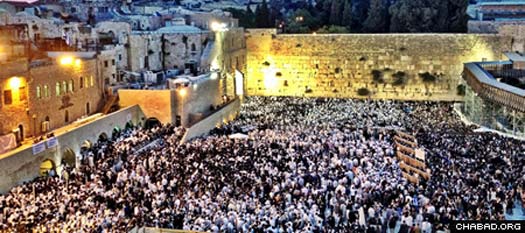
‘Pulling an All-Nighter’ for the Sake of the Torah
David Adler has a family and runs a business, but on Tuesday night, he’ll be up late for a different reason—learning Torah.
“I may not stay up all night, but I try to make it until at least midnight,” said Adler, who attends Chabad in Sandy Springs, Ga., a suburb north of Atlanta. He said he has been participating in the Shavuot night learning tradition for nearly 35 years.
The two-day holiday of Shavuot, which begins sundown on the 5th of Sivan and lasts until nightfall of the 7th of Sivan (this year, Tuesday at sundown until Thursday at sundown), commemorates the giving of the Torah by G-d to Moses at Mount Sinai more than 3,300 years ago. Every year at Shavuot, it’s like the Torah is being re-given again. In anticipation of this remarkable event, Jews count down from Passover 50 days until the holiday of Shavuot.
But according to the Jewish sages, even though the Jews were expecting Moses to return with the precious gift of Torah, they overslept. To atone for this, Jews stay up all night—or most of the night—studying Torah.
Rabbi Yossi New, director of Chabad-Lubavitch of Georgia, said in places like Atlanta, where it’s nearly summer, the learning starts late, versus parts of the world where Shavuot falls in the winter. After praying and eating a festive holiday meal, he said, the men will return to synagogue to begin learning at around 11 p.m.
New grew up in Australia, where Shavuot took place during the winter and started earlier. “Even as a young child, we used to go,” he said.
People stay as long as they are able, without any pressure.
“Some pull all-nighters,” said New. At his shul, the first couple of hours include structured learning such as lectures, and then later in the evening and early morning, folks break up into one-on-one and group study.
This year incorporates an expanded teen program; Chabad has been reaching out to teens in the community, inviting them to participate by calling, emailing and texting, said New. There also will be a parent and child study program, in addition to a prepared text that can be used by people at various levels of learning.
The rabbi realizes that it can be a challenge to stay up so late, so some incentives are naturally for the taking: “We are offering midnight snacks to add some excitement.”
Seasoned Learners will Study Special Text
As part of Chabad tradition, more seasoned learners will study Tikkun Leil Shavuot, which includes excerpts from the beginning and end of each of the 24 books of Tanach, including the account of the days of creation, the Exodus from Egypt, the giving of the Ten Commandments and the Shema, as well as the 63 books of Mishnah. This is followed by the reading of the 613 commandments as enumerated by Maimonides and excerpts from the Zohar. The reading is divided into 13 parts.
The word Shavuot means “weeks,” as it marks the completion of the seven-week counting period between Passover and Shavuot.
Staying up to study shouldn’t be seen as intimidating or reserved only for the most learned Jews, said Rabbi Shmuly Weiss of Chabad serving McGill University in Canada.
“Every person is different,” said Weiss. He said his school, like many universities, doesn’t typically have many students who participate because they have gone home for the summer. But they do offer some learning programs for those still in town.
“Although this year Shavuot will be at the beginning of the much quieter summer semester, we have a full holiday schedule planned,” said Rabbi Aharon Notik, associate rabbi and co-program director of Chabad serving the University of Florida in Gainesville.
This includes holiday meals and services, he said, as well as a special reading of the Ten Commandments on Wednesday afternoon, followed by a dairy buffet, as is customary on Shavuot.
“We keep this tradition alive with study opportunities available for most of the evening and early morning hours,” said Notik. “We will be discussing the Ten Commandments in depth and their relevance to our daily lives in a modern world.”
“Being that many of our students are away for the summer, we are also able to offer smaller group-study opportunities on a broader range of topics—from the mystical aspects behind our receiving the Torah at Sinai to the more practical application in halachah (Jewish law).”
Notik pointed out that it’s the second time in just a matter of months that Jews stay up all night. The last time was during the seventh night of Passover because that’s the night the Jewish people crossed the sea while fleeing the Egyptians. To commemorate that important event, Jews stay up learning.
He added that this time around, it’s not just about commemorating an event; it represents real preparation for receiving the Torah. He tells his students that it’s not just a history lesson—the Jewish people actually receiving the Torah again.
“So staying up all night is not only because back then they should have been awake at the crack of dawn. It’s more than that. We are about to receive the Torah again, and we should be ready for that,” said Notik. “Let’s try to understand what that means to receive the Torah and what can we take from that the rest of the year.”












